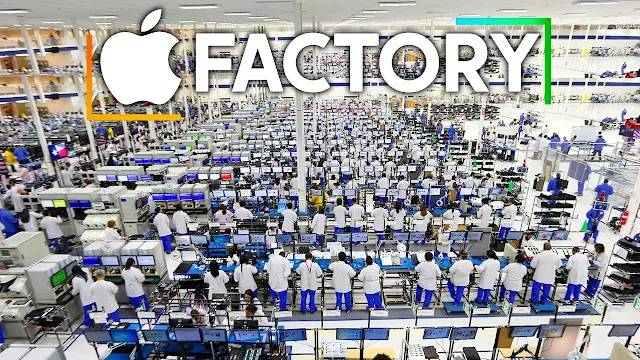
The Mammoth Production Plant
When one thinks of Apple, the iconic iPhone, iPad, and Mac devices immediately come to mind. But have you ever wondered where these products are manufactured? The largest Apple manufacturing factory is the Foxconn Technology Group's Zhengzhou branch, located in China. This mammoth production plant occupies a record 15 million square feet and is often referred to as the "iPhone City," as it is capable of producing up to 500,000 iPhones daily.
The Foxconn factory in Zhengzhou is a true marvel of modern manufacturing, employing up to 1.3 million people, making it the largest private employer in China. The sheer scale of this operation is staggering, with the factory covering an area of approximately 1.2 square meters or 3 kilometers, and featuring amenities like swimming pools, 15 factories, a television network, and even a fire brigade.
The Daily Grind
A typical day for a Foxconn worker begins at 6:30 a.m. when they wake up and report to the factory by 7:00 a.m. The shift starts at 8:00 a.m., with a one-hour lunch break, and often ends between 8:00 and 10:00 p.m. in the evening. This grueling schedule is not uncommon, as many workers are required to work 12 hours a day, six days a week.
The work itself can be repetitive and monotonous, with some workers specializing in tasks like fastening chipboards, completing around 700 pieces per day. Others may work on assembling 1,700 iPhones daily, which translates to 12 iPhone screens per hour. While the work may seem overwhelming, many workers find it manageable, citing the high pay and proximity to their families as reasons for staying.
Living Conditions and Controversy
The living conditions for Foxconn workers have been a source of controversy over the years. The factory provides dorms for its employees, which are often described as overcrowded and lacking in proper sanitation. In 2012, some Foxconn employees even protested against the poor living conditions and inadequate meals.
Foxconn has also faced accusations of labor abuses and severe penalties for workers who make mistakes. Between 2010 and 2011, the factory experienced a series of worker suicides, which prompted both Foxconn and Apple to make changes to address the situation.
The Government's Role
The success of the Foxconn factory in Zhengzhou is not solely due to the company's efforts. The Chinese government has played a significant role in supporting the factory through tax incentives, subsidies, and infrastructure development. The government has helped Foxconn build power plants, new roads, and cover transportation and energy costs, ensuring the factory's continued operation.
Additionally, the government has been involved in regulating the number of employees from local cities and villages working at the factory. The provincial government has also sent students from trade schools to work at Foxconn, a practice that is reportedly illegal under Chinese regulations.
The Workforce
The Foxconn factory in Zhengzhou employs a diverse workforce, with many workers in their 20s. While some employees find the work repetitive and boring, others appreciate the high pay and minimal pressure. However, the high turnover rate is a concern, with many workers leaving after their first year due to boredom and lack of interest.
The workers come from various backgrounds, with some enjoying the proximity to their families and the ability to visit them on weekends. Others, however, complain about the lack of sleep due to the alternating shifts and the overall monotony of the work.
Conclusion
The Foxconn factory in Zhengzhou is a remarkable feat of modern manufacturing, producing a significant portion of the world's Apple devices. However, the factory's success has come at a cost, with workers facing challenging living conditions, labor abuses, and a grueling work schedule.
The Chinese government's support has been crucial in maintaining the factory's operations, but the ethical implications of this arrangement remain a topic of ongoing debate. As consumers, we must consider the human cost behind the devices we use and advocate for better working conditions and worker protections.
The story of the Foxconn factory in Zhengzhou is a complex one, revealing the intricate web of global supply chains and the human experiences that underpin the technology we rely on every day.





.jpg)


0 Comments